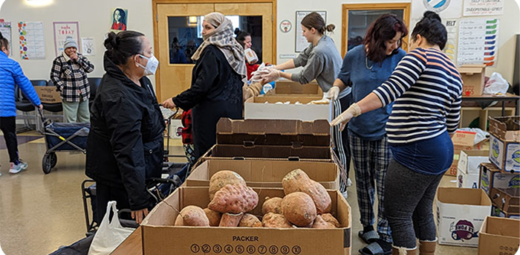
Apr 26Partners in food security
From Boise to Bellingham, and from Bellingham to Portland, Mercy Housing Northwest has worked with invaluable partners who assist us in addressing food insecurity. Exiting the pandemic, Mercy Housing Northwest residents reported feeling more food secure. Several factors contributed to this, including the expansion of SNAP benefits, expansion of the child tax credit, bulk donations of raw food, and Resident Services team members available to help navigate the system.
With many of these programs coming to an end, Mercy Housing doubled down on community partnerships. For this edition of the Northwest Newsletter, we would love to highlight two of those partners.
Eagle Community Foodbank
In 1997, school counselors and resource officers banded together to provide food assistance to families in need. By 2002, the effort grew into a fully realized food bank, incorporating as a nonprofit organization in 2013.
Now the food bank is open four times per month, serving 350–500 people. Their model allows people to make selections based on their family’s tastes and preferences. For guests who can’t make it to the food bank, such as seniors at our 12th & River community, Eagle Community Foodbank delivers, and also stocks an onsite mini pantry.
From the beginning, “Our community has responded to the needs of our neighbors. Since the pandemic, that need has only grown, and we will continue to do everything we can,” community volunteer Twila Dover, shared.
Food Lifeline
Food Lifeline is on a mission to end hunger in Western Washington. Annually, they provide food to 1.37 million people, distribute food to a network of 350 food banks, and provide 282,000 meals every day.
Food Lifeline distributes food through their Mobile Food Program throughout King, Snohomish, and Pierce counties.
Working with Resident Services staff and residents directly, they deliver food twice a month to 11 Mercy Housing Northwest communities. Residents then make selections based on their individual needs.
No related posts.
Stay Up To Date
Get news on Mercy Housing and inspiring stories of change delivered to your inbox.


